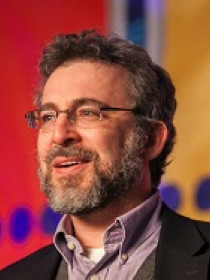
Micah Altman
Director of Research, MIT Libraries, Massachusetts Institute of Technology
Non-Resident Senior Fellow, Brookings Institution
Chapter Member: Boston SSN
Areas of Expertise:
Connect with Micah
About Micah
Altman conducts work primarily in the fields of computational social science and information science - focusing on the intersections of information, technology, privacy, ethics, and government. He has authored seven open-source software packages and several books that span information science, statistics, computer science, social science, and law.
Contributions
In the News
"Create Real Redistricting Reform through Internet-Scale Independent Commissions," Micah Altman (with ), Harvard Law and Policy Review: Notice & Comment, April 4, 2014.
"Re: Big Data Study: Request for Information," Micah Altman (with ), response to request for information, White House Office and Science Technology Policy Big Data and Privacy, March 31, 2014.
"Re: Proposed Rule: Improve Tacking of Workplace Injuries and Illnesses," Micah Altman (with ), response to request for comment on proposed rulemaking, Department of Labor, Occupational Safety and Health Administration, March 8, 2014.
Micah Altman quoted on the business of data brokering by Adam Tanner, "Bizarro World of Hilarious Mistakes Revealed in Long Secret Personal Data Files Just Opened" Forbes, September 5, 2013.
Micah Altman quoted on creating “optimally compact” districts (with Michael P. McDonald) by Llewllyn Hinkes-Jones, "Why Computers Alone Can’t Eliminate Corruption in Redistricting" Atlantic Cities, February 26, 2013.
"How Participatory Technology is Changing Redistricting," Micah Altman, TechPresident, February 8, 2012.
Micah Altman's research on district-building (with Michael P. McDonald) discussed by , "There’s a Map for That: Can Redistricting be Opened to the Public through Open Source and the Web?," O’Reilly Radar, December 20, 2011.
Micah Altman's research on district-building (with Michael P. McDonald discussed by , "Crucial Redistricting Season Underway: Fire Up the Open Source GIS Software," Epoch Times, August 11, 2011.
Micah Altman quoted on on how technology can democratize district-building by Daniel Kurtzleben, "Technology Gives Citizens a Say in Redistricting" US News & World Report, March 9, 2011.
Publications
"Public Participation GIS: The Case of Redistricting," (with ), Proceedings of the 47th Annual Hawaii International Conference on System Sciences, IEEE/Computer Society Press, 2014.
Shows how three major factors influenced the effectiveness of efforts to increase public input into the political process through crowdsourcing. First, open electoral mapping tools were a practical necessity to enable substantially greater levels increase public participation. Second, the interest and capacity of local grassroots organizations was critical to catalyzing the public to engage using these tools. Finally, the permeability of government authorities to public input was needed for such participation to have a significant effect.
"Communicating Science and Engineering Information Data in the Digital Age," (with ), National Academies Press, 2012.
Summarizes challenges and best practices for disseminating government statistics. And recommends that best practices require shifting emphasis from the dissemination of reports to the dissemination of data of replicable, auditable, authentic data through open public API’s.
"National Agenda for Digital Stewardship," (with ), Library of Congress, 2013.
Argues that digital stewardship is vital for the authenticity of public records, the reliability of scientific evidence, and the enduring accessibility to our cultural heritage. This report identifies the highest-impact opportunities to advance the state of the art; the state of practice; and the state of collaboration within the next 3-5 years.
"Publishing: Credit Where Credit is Due" (with ). Nature 508 (2014): 312-313.
Argues for increasing transparency in research through formally documenting and publishing all substantial contributions to the research supporting a published finding, and provides a taxonomy of roles that can be used to increase comparability of contributions across research publications.
"Numerical Issues in Statistical Computing for the Social Scientist" (with ) (John Wiley and Sons, 2003).
Demonstrates the widespread sensitivity of the results of statistical analysis in social science to hidden computational choices and to measurement error. We develop methods to test statistical results for robustness to algorithm choice, software implementation, and measurement error.
"Modeling the Effect of Mandatory District Compactness on Partisan Gerrymanders" Political Geography 17 (1998): 989-1011.
Uses computer simulation and optimization methods to show how compactness standards can be used to limit gerrymandering, but only if such standards require severe compactness. This article was cited by the Supreme Court in the United States, in both the plurality and dissent, as part of their Vieth v. Jubelier 2014 decision.